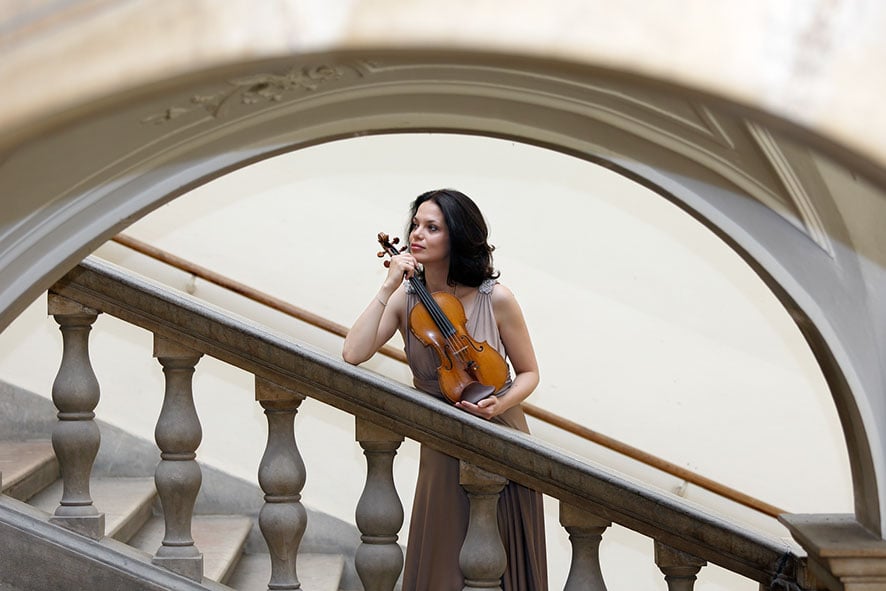
In this series, mica – music austria and Austrian Music Export have collected the experiences and perspectives of women in the music business. No matter the categories, quotas or breakdown, the goal is 100% of us working together in the struggle for feminism. In this interview, violinist BOJIDARA KOUZMANOVA (Kreisler Trio Vienna) talks about her personal experiences in the music sphere and the hard work it requires.
How and where did you get your experience in the music business?
Bojidara Kouzmanova: By playing, and by organizing things for myself – a lot. I play mostly chamber music, so there’s no employe, and you’re not sitting in a big collective (like an orchestra) where someone else is taking care of everything. As a chamber musician, you have to have a lot of initiative and do a lot of organizational work; without those two things, having a career is impossible.
What were your biggest challenges and how did you overcome them?
Bojidara Kouzmanova: When I was young, the biggest challenge was money. I overcame that, too, by working hard. I financed my entire university studies through teaching and playing, and that was one of the best life lessons I could have had. When I was 30, I had already been teaching for over ten years.
“I was always given responsibilities that weren’t quite right for anyone else, but they were right for me.”
What kind of career support have you received?
Bojidara Kouzmanova: Very different kinds. I never had a “mentor”. I was always given responsibilities that weren’t quite right for anyone else, but they were right for me. For instance, I got to “break in” a lot of valuable instruments – I was able to spend time with them, practice and perform with them. I got to know and love them. In return, I learned how to approach sound, how to get the tone I wanted out of different instruments. How do you approach a Stradivarius, a Guarneri…? It was a really interesting time, and it did a lot to expand and enrich my conception of sound – which I count as one of the most important tools for a professional musician to have.
Where would you have liked to have (more) support?
Bojidara Kouzmanova: When I was studying, it would have been enormously helpful to have financial support for courses and contests. I always had to earn twice as much if I wanted to take part in a course or a contest – I had to pay all the bills in Vienna plus the costs of travel, accommodation, and the contest or course fees. Obviously, that made preparation very difficult.
“There were a lot of successful female soloists, but they didn’t seem to have a family life, and I always wanted both.”
Did you have appropriate role models around you to look up to?
Bojidara Kouzmanova: In music, not really. There were a lot of successful female soloists, but they didn’t seem to have a family life, and I always wanted both. But the more I read about women in the music business and music history, the more I saw that each of them had their own way of dealing with the necessity of living two lives and giving 100% in both of them. From them, from my own experience, and from a level of endurance that you wouldn’t believe possible until you develop it – I learned a lot. I also had the good fortune to meet a few amazing women who showed me that a lot is possible if you just don’t give up.
What can you pass on to others?
Bojidara Kouzmanova: An open ear and an open heart for a great many problems that can crop up in the life of a music student or professional musician, as well as a lot of experience and the will to help.
“I’m taken seriously and respected for who I am and what I do.”
What role does age play for you?
Bojidara Kouzmanova: For me, a positive one. 🙂 I was never a prodigy, and – thank God – I’m well past that age. I’m taken seriously and respected for who I am and what I do, which is a lot easier for some people the older I get.
What would you like to see in terms of a more diverse music scene?
Bojidara Kouzmanova: That it doesn’t matter WHO plays, but HOW they play. That a person’s musical qualities are more important than everything else, and – as long as no one is disadvantaged by it – that every person can be the way they are.

What questions do you get asked that a man would never be asked?
Bojidara Kouzmanova: “How do you balance a career and a child?!” My husband never gets asked anything like that…
In conclusion, a statement from Bojidara Kouzmanova:
The questions were complex, and it’s always difficult to answer without thinking of a specific situation. Sometimes I just got lucky, sometimes my youthful naivety got me further than I had ever thought possible (when you don’t know what you don’t know, it’s easier to learn). In any case, it was a whole lot of work. And that’s the driving force in my career to this day.
Translated from the German original by Philip Yaeger.
